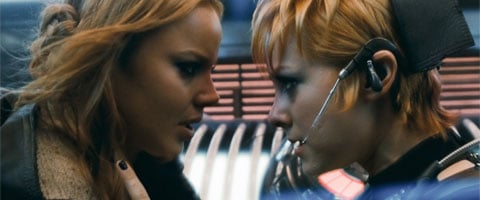Interview: Sucker Punch's Emily Browning And Abbie Cornish

Your Daily Blend of Entertainment News
You are now subscribed
Your newsletter sign-up was successful
One is facing a ticking clock and needs to find a way to escape in order to avoid being lobotomized. The other is a hospital veteran who is fully cognizant of the punishment that they could face should they get caught. But without Babydoll (Emily Browning) or Sweet Pea (Abbie Cornish), there is no Sucker Punch.
This past Sunday the two actresses took part in a roundtable interview with journalists, including myself, to discuss the Zack Snyder film, which comes out this Friday. Check out the interview below, in which they discuss the training process in preparation for the role, the musical number that ended up getting cut, and daydreaming.
I just saw you a couple of weeks ago in New York for Limitless, and I wouldn’t have recognized you between the two roles. Can you say briefly how you conceive the difference between these two women that you’re playing?
Abbie: Yeah, I’m in two whole different worlds between Limitless and Sucker Punch. Sucker Punch was such an experience of its own. The training leading up to it, the type of film that it is, the concept, which is just so different from anything else I’d ever been a part of before. It’s kind of hard to contrast and compare them because I feel like they are such separate entities.
Well you’re a normal, ordinary, contemporary woman in Limitless, and in this you’re a tragic, person who’s not even in an orphanage, but a mental hospital.
Abbie: The back story with Sweet Pea and Rocket, played by Jena Malone, (they’re sisters), so the back story was that Rocket had done something that Sweet Pea took half the blame in order for her not to be on her own. And I think Sweet Pea was hoping that they would go into the asylum for a bit and then they would be let out, but that wasn’t the case and they’ve been in there for a while. And it’s a strange situation that Sweet Pea’s in, essentially, she shouldn’t be in there. And the protection and the care she has for Rocket is overwhelming in so many regards. And I think Sweet Pea’s kind of squashed herself in that place. There’s a survival instinct in regards to that environment where she’s kind of put all the beautiful things about what it is to be human, what it is to be alive, deep down inside her and has had to protect the inner child, has had to protect the sensitivities, and develop really tough outer shell to kind of stay in the hierarchy that she’s in within that system. So it was definitely an interesting character to explore, and an interesting character to explore in all those different dimensions. And I mean you could think about it and talk about it forever and still be discovering new things.
Congratulations on being in almost every frame of the film, it must have been quite exhausting. And not only are you busy acting, you’re busy singing. Was that something that was talked out at the beginning, is it something that worked through the character? How did that work in for you?
Your Daily Blend of Entertainment News
Emily: Well music was always going to be a big element in the film. Originally there was going to be a song within the film, you know there’s a scene of us singing and I think that will probably be in the special features of the DVD. So originally when I auditioned for Babydoll Zack asked me to put myself on tape singing, which I’d never done before, but I mean I just really wanted to work with Zack and I really loved the script so I did it for him, I put myself on tape and he obviously liked it, I have no idea why, he decided I was capable. Then after I got the part, I think it began because we were talking about that The Smiths were my favorite band and Zack said, “Oh yeah I know Morrissey.” I was like, “Uh…that’s the coolest thing I ever heard” and was kind of amazed by that. Then a couple of weeks, I mean I asked him, of course, to tell me everything, ever, about Morrissey, but then we kept talking about that and after a while he said, “I got the rights to a Smiths song for the soundtrack.” I was like, “That’s incredible, that’s awesome.” He said, “Do you want to sing it?” So I was like, I mean, I was terrified of course there’s so much pressure there, but I couldn’t say no to the fact that Zack trusted me and thought that I would be capable of doing something like that. It was flattering, it was an honor. So I recorded the song with Marius and it worked out. And then Zack asked me to sing another song and then they asked me to sing another song and it just sort of happened pretty organically.

So did you train?
Emily: No.
Were you able to get any feedback from Morrissey?
Emily: Well Zack said that he’s heard it and he was happy with it. I hope that’s true because that would be the biggest compliment of all time. Maybe Zack just wanted to make me feel a little less nervous about it.
What was the song that you guys sang in the scene where you guys sing…
Emily: It’s a soul song, it’s called “Ooh Child”, and it’s by a band called the Five Stairsteps but Nina Simone did a cover of it and Beth Orton has done a cover of it and I think it’s been covered a lot of times by a lot of different women.
What do you think these women, there’s a thing in Entertainment Weekly where, it’s one page where Zack is quoted as, “What do these five girls represent?” and the first thing that he said was about the idea of freedom. For both of you can you try to talk about what these characters are supposed to represent in the context of this movie?
Abbie: I think from Sweet Pea’s perspective it’s such a journey that she goes on in there and the sisterhood is very strong within the film and I think there’s a message there, I think, what I talked about before, about the way she’s chosen to survive in this environment and what that’s done to her. You can transpose that into life and situations that people might find themselves in life and this idea that we live within the world, we live within a society, we live within certain cities, certain cultures, environments, that of course are gonna influence us and affect our days. And so how to deal with that. What is the process of dealing with that. And I think for Sweet Pea that idea of freedom is something that she is disillusioned about and so that journey of spreading the wings, of being able to breathe again, of being able to feel again, connecting to herself again, is her journey. So speaking for my character it feels like it was about that. About someone who went from where she is at the beginning of the film to opening, and to feeling, and to breathing.

So she’s a prostitute at the beginning. I mean it’s never really said, and I thought it’s a PG-13 movie, maybe they don’t want to say you’re turning tricks or something.
Abbie: But the reality of the film is a psychiatric ward, it’s an asylum, and so that sub-reality is almost like a projection of the way Babydoll is seeing it. Her fantasy, her mind.
Emily: In my mind, Babydoll, the character went into the, I mean I suppose this is clearer in the original version of the script, the abuse that…I think it’s clear in the montage at the beginning with the stepfather what’s about to happen to these girls. And I think for me, Babydoll, at the beginning of the film is sort of her own, she doesn’t understand her own sexuality and it’s being used in this negative way in terms of the stepfather. And that’s why, for me, at least, that the journey from the asylum into the brothel, in Babydoll’s mind, that’s why her darkest fear of being in this place becomes a sexual thing, because that’s something that she’s been frightened of. And I think over the course of the film, she learns to own and control her own sexuality and not be objectified. Because I think within the world of the brothel, these girls are being objectified, not in the film itself but within that story the girls are being objectified and I think moving on into the battle scenes it’s about them owning, not allowing themselves to be objects anymore and owning their own strength.
Was there ever any plot to allow us to see even a little bit of your supposedly awe-inspiring dancing? Or would that remove the mystery.
Emily: Absolutely. I think someone referred yesterday to the suitcase in Pulp Fiction, that, like, you don’t want to know what it is because your imagination can always create something far more amazing. And then it’s individual to each audience member and each person that watches it, seeing the dance would have taken away some of the magic, especially for me dancing!
Do you have any dance background?
Emily: I have a little bit, I did dance classes when I was younger. But I don’t think I’d put anybody into a trance.
So most of this film deals with being lost in your own thoughts and your own fantasies. Do you use that as a coping mechanism in any way?
Emily: I’m a massive daydreamer. I’m constantly lost within my own fantasies and my own thoughts personally, and I think maybe that is sort of represented in what we do for a living, the fact that we make believe everything and we escape into these other characters for a living.

Do you think that too Abbie?
Abbie: You know, it’s interesting because this question has come up a few times and when I think about the things that I do to escape, they are the things that make me feel most connected to myself. So for me there’s a juxtaposition there. What do I do to escape, do I listen to music, make music, I paint, I surf, I take photographs, I watch a film, and all of these things are for me, the core of who I am and so it’s such an interesting thing for me, you know?
I was shocked in the notes it said you guys started training four weeks before?
Abbie: No, we had three months.
So how much wirework was included in that?
Emily: We started wirework in Vancouver, because we did a month of training in Los Angeles, Jena Malone and myself, then we went to Vancouver, we did a month, and then the last month Vanessa and Jamie joined us. So we kind of started the wirework in Vancouver and it was very specific to that stunt, that moment in the film. It wasn’t like martial arts where we’d go in and for the first month and a half, with the martial arts training, we were just training technique, learning all of these repetition of sword strokes and different forms of martial arts, just getting there. And it wasn’t until a month and a half before we shot that we started to hone in on the choreography and all the pieces and so it was really intense.
Emily: We didn’t spend that much time on the wires though really considering what we actually had to do, this crazy four-story drop. And it was like free falling, it was kind of amazing, it was like an adrenaline rush.
Scary?
Abbie: We were feeling pretty tough by then, it was scary but in the best possible way, in the way that a rollercoaster is scary.
Emily: Yeah, it was like going to Six Flags or something.
Abbie: We felt entirely safe, it was never like, “I am fearing for my life,” it was just like, “My guts are in my throat.”

And it was some of the guys from 300, right, training you?
Emily: Yeah, Zack a lot of the time, when he finds people that he really enjoys working with, they’ll work with him on the next film. So we were really lucky because the crew that we had on Sucker Punch, a lot of those people had worked with Zack numerous times and so it’s such a solid, well-oiled machine. It was great to walk into that.
You felt safe, you didn’t feel like you were in Spiderman: The Broadway Musical.
Emily: Not at all.
Do you want to be in more of Zack’s movies now that you’re in a couple?
Emily: Sure it would be amazing.
Abbie: It’s the best experience I’ve ever had on a film. We all just had so much fun and made such great friends and it’s like a little family.

Eric Eisenberg is the Assistant Managing Editor at CinemaBlend. After graduating Boston University and earning a bachelor’s degree in journalism, he took a part-time job as a staff writer for CinemaBlend, and after six months was offered the opportunity to move to Los Angeles and take on a newly created West Coast Editor position. Over a decade later, he's continuing to advance his interests and expertise. In addition to conducting filmmaker interviews and contributing to the news and feature content of the site, Eric also oversees the Movie Reviews section, writes the the weekend box office report (published Sundays), and is the site's resident Stephen King expert. He has two King-related columns.
